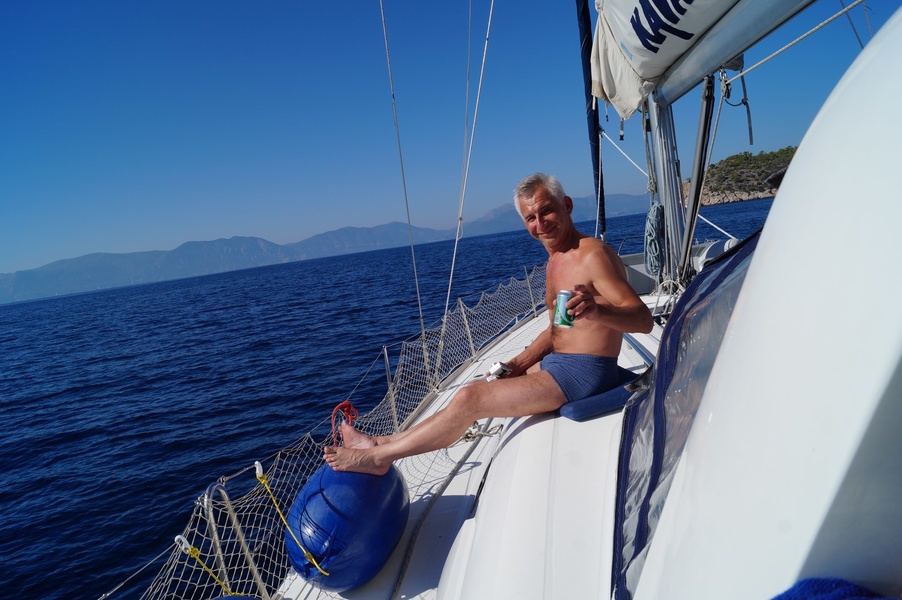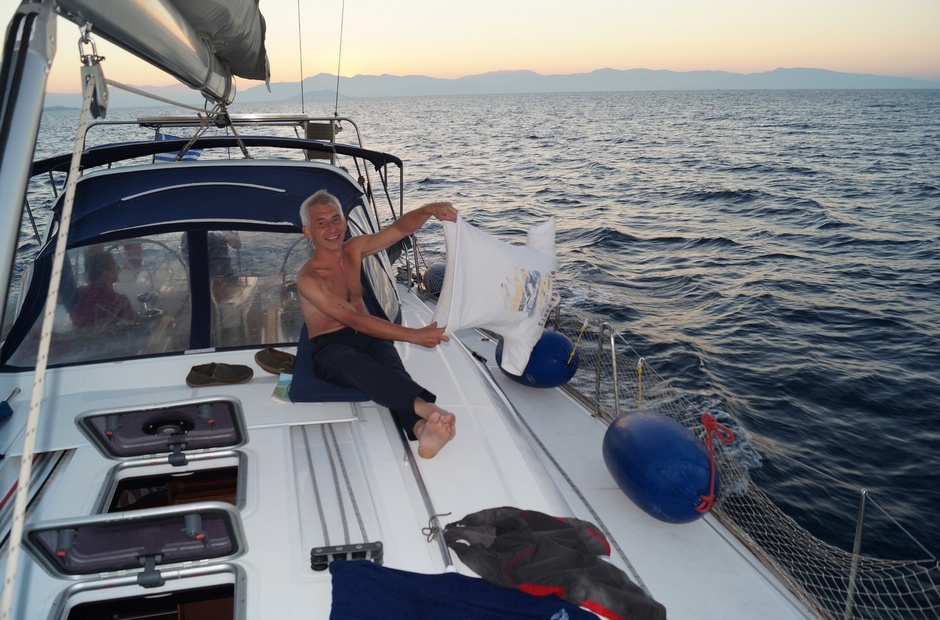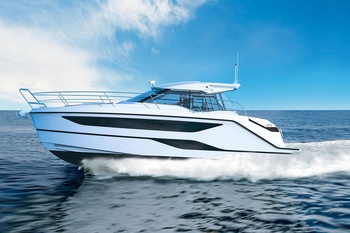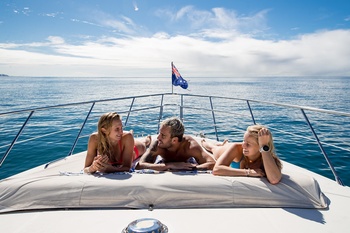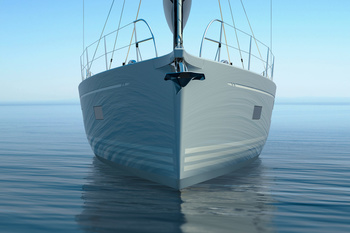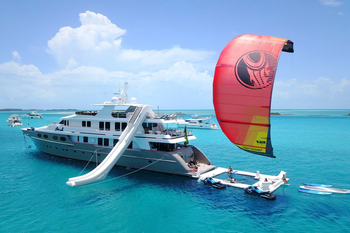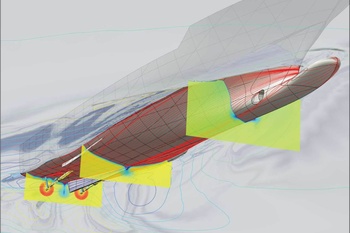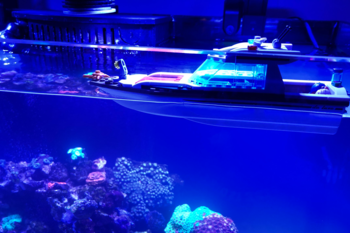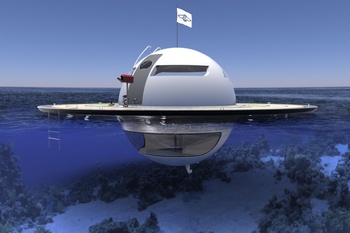«Hello, hello! Do you want to take a boat trip around the Aegean Sea? The crew is great, and we already know everyone there. Anyway, take your ticket, we'll meet you in Athens!»We met the Commander more than 20 years ago in one of those exotic seas, over which the Southern Cross shines brightly. So it's no wonder I immediately agreed. And here's what came out of it...
Hurry up and get out to sea
From the Venizelos airport, the five of us took two taxis with great chic (otherwise, no extensive luggage could fit) and after 25 minutes we found ourselves in the Alimos marina, located in the near Athens suburb of Kolomaki, thus facilitating our joint budget for 65 euros.
The first impression was an extraordinary abundance of boats and... Before entering the pier, a toilet is a toilet, elegantly combined with showers, in which, as it later became clear, only cold water was available. Next, a canopy over a table with long benches, next to a giant barbecue stove, and finally a kind of barracks: a wood and plastic lounge, where the office of a charter company, the owner of which my friends were already familiar on their previous trip.
Soon he himself - Mr. S. - appeared, a brown, dry, middle-aged Greek of short stature, wearing a poured out shirt, shorts and sandals on his barefoot. The meeting turned out to be very cordial - all of us immediately turned into an «old Frenchman», who were immediately invited to the office, treating them to a choice of beer and soft drinks. When the souls of Russian tourists tired of flying and traveling a little softened, the most interesting thing began - the choice of a boat with a side-by-side discussion of the price for the expected from its use pleasure.
Recognizing myself to be a complete prodigy in the types and capabilities of yachts, I placed my full confidence in the experience of my colleagues in this matter, focusing (to the extent of my modest abilities) on helping to translate the mutual proposals.
Our position was simple: to get a boat as big as possible for a minimum fee.
Taking into account the peculiarities of our linguistic training at the time, the most important details of the negotiations - the numbers - Mr. S. wrote (and we were busily correcting) on a sheet of paper.
After half an hour of such exercises, a preliminary agreement was reached: for a symbolic (as for «old friends!») amount of 1900 euros, we received at our full disposal for 12 days Bavaria 46 with four cabins and two bathrooms.
The sailing arms of the boat included a standard mainsail and a twist jib. The spinnaker, Mr. S. refused to give us a cut and, as it turned out later, was absolutely right.
To the sincere surprise of the charter company staff, the process of seeing the boat took us only 10-15 minutes.
After each brief explanation by a Filipino sailor, accompanied by the manipulation of various buttons, levers and handles, we nodded solidly and pronounced the confident Jes«! with» the sight of real sea wolves, who have repeatedly crossed the ocean on yachts of this type. «Filippock» looked at us suspiciously, but apparently he did not dare to question the degree of experience of such a solid crew.
Much more attention was paid by its members to the supply of food and (especially!) drinks to the expedition. Random witnesses of our departure were slightly surprised to see numerous crates of beer, bottles of wine and the invariable Ouzo «loaded on board.»One of the attendants cautiously asked where we were going to take all the other passengers aboard. When it turned out that all these supplies were designed to sustain only five people for 5-6 days, curious only shake his head respectfully, muttering something like: «Afto eina and apistefto!» (Greek. «Unimaginable!»)
When finally everything was packed, laid out, placed and secured, the sun was already close to the horizon. It was fast, but it could not stop the brave mariners. Shy offers to spend the night in the marina were suppressed by an absolute majority of votes, after which the Commander started the engine, the newly baked sailors gave the mooring ends and ... ...our journey began.
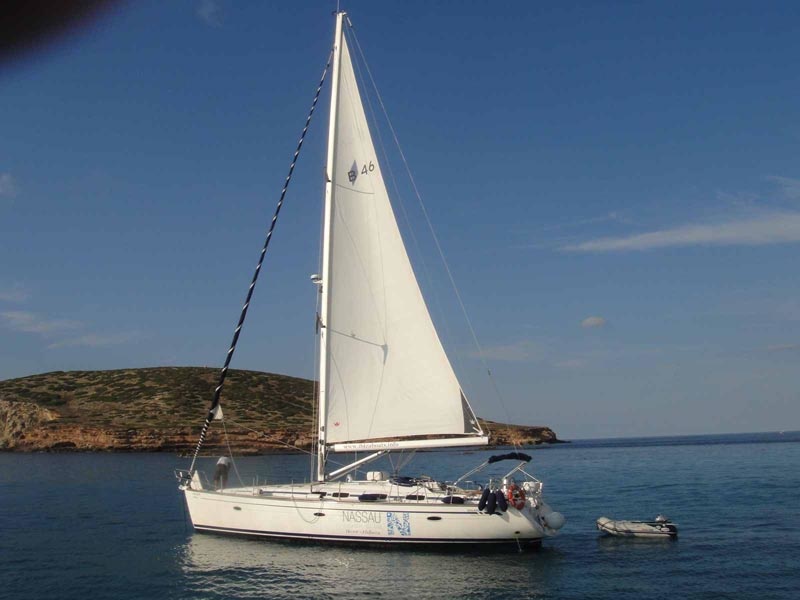
Visiting black rabbits.
Having carefully made our way between the boats that literally packed the marina Alimos like a can of sprats, we finally reached the relative expanse of the Saronic Gulf. The sun was almost disappearing behind the island of Salamis, a light breeze (5-8 m/s) was blowing and the happy Argonauts decided to put the sail ...
Then the events took an unexpected turn. At first we heard exclamations with prevailing specific maritime terms (apparently, it was about finding handles for the winch). Then the jib twitched, reluctantly climbing out about a quarter of its size and... stopped. For the next half hour two of us fought a capricious sail, two more of us gave tools and useful (in their opinion) advice, and the rest tried to keep the boat on course.
Nothing could resist the friendly actions of a close-knit team: at one point a strange click was heard and <...> the genoa finally turned around and took the wind.
The success so inspired all the participants of the experiment that it was immediately decided to put up a grotto as well. This time the task was quite coped by two people - quite quickly and with a minimum number of non-parliamentary expressions. The boat has sharply leaned on the port side and quickly slipped on the wine-coloured (in the evening twilight) sea... It must have looked so resolute that the captains of one or two oncoming dry-cargo ships did not even try to express their admiration on VHF, and the passengers of a small pleasure boat (and, it seems, all its sailing hours) welcomed our brilliant maneuvers with cheerful waving of hands and emotional shouts.
But we didn't feel the spectators' delight: by that time we had already managed to turn on the on-board navigator, define our place and even map it. This was followed by a dashing turn of the Fordewind, in which the helmsman was swept by a wave and the grotto-guik almost threw two more crew members overboard. After that daring maneuver, the boat calmed down a little and moved quite obediently south-east. Where to? That's the question we had to solve now.
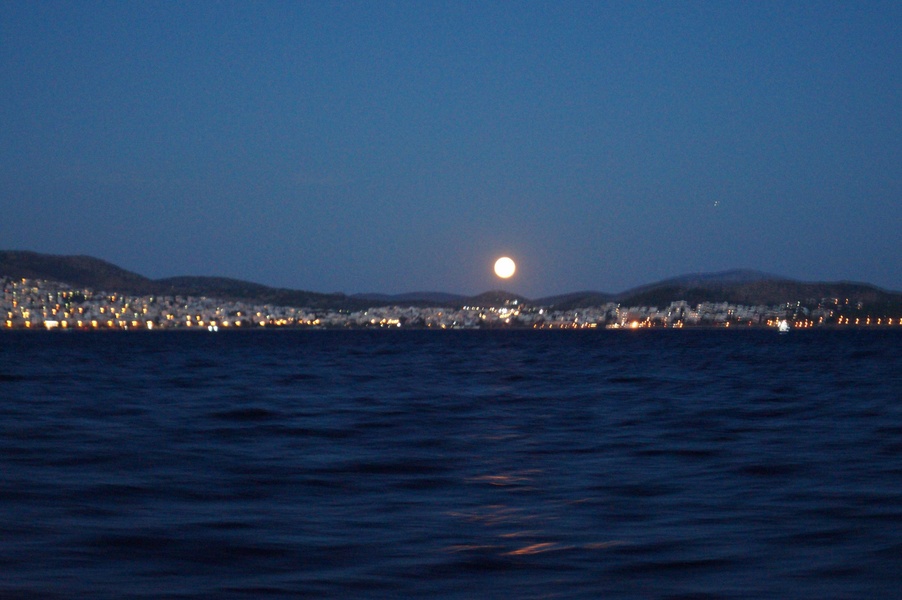
The night promised to be moonless, and we suddenly felt that we somehow did not want to spend it at sea. In its standard configuration, our «Bavaria» was not equipped with radar or even a radar reflector. All the navigation lights were lit, but with enough activity in this part of the Saronic Gulf, the risk of completing the voyage under the bow of a larger vessel seemed too real to us. So it was decided to spend the night somewhere at anchor, and with the first rays of the sun to go further. This cherished «place» turned out to be a cozy bay on the west coast of Flevis Island, where we, removing the sails (the staysails were again whimsical during the curtailment) got involved in total darkness, navigating on the navigator and echo sounder.
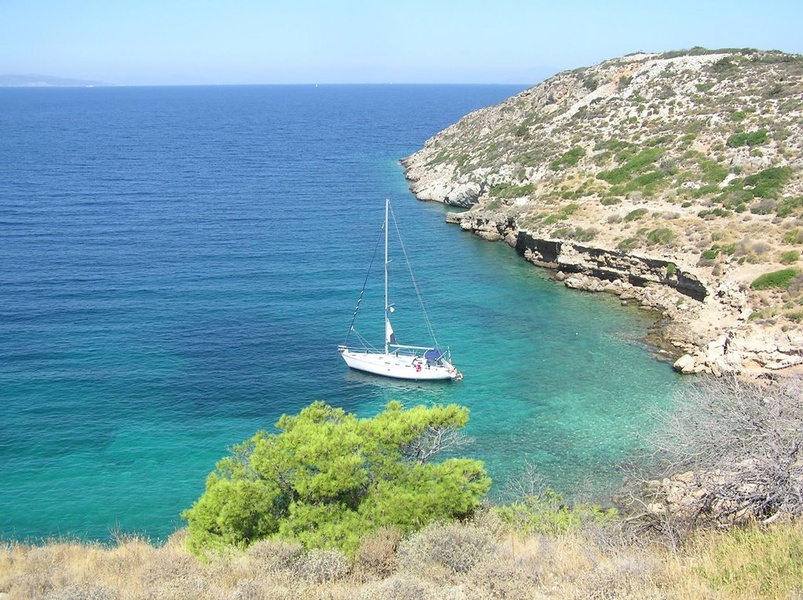
My colleagues had already been here on their first hike and hurried to tell me that the island is absolutely uninhabited, except for the black rabbits. Apparently, they are still hunted by natives and visiting tourists, because here and there on the island there are whole scatterings of casings - and (for some reason) more and more from the combat weapons ...
It was only much later, after a closer look at the map, that I found a warning inscription saying that Flevis Island is the property of the Greek Navy, so not only do you land, but it is strictly forbidden to approach the island closer than three cables.
Fortunately, we were in blissful ignorance at the time, so having anchored at a 12-meter depth and had a rich dinner, we were able to quietly start discussing further plans.
Sail, ripped the sail...
The original goal of our expedition was the island of Delos, which we were going to reach by circling the Cyclades from the northeast and looking at Kea, Syros and Mykonos along the way. Returning was offered by the southern route through Sifnos, Serifos and Kithnos. However, the calendar and weather made some adjustments. It was late October, and the prevailing northeastern winds were gaining strength every day. Already at the exit to the Gulf of Petalyon the forecast promised 30-40 knots of wind, and from the north one after another were coming areas of low pressure, promising a periodic increase in wind speed to 50 knots and above. By the way, from visiting the Cyclades in such conditions, Mr. S. warned us persistently, rightly fearing if not for the well-being of their clients, then at least for the fate of the boat.
But can such trifles stop five determined men, three of whom by that time managed to swim on a yacht for several hours in the Gulf of Finland?
It was decided not to change the basic plans, but to practice a preliminary «run» through the Saronic Gulf to the island of Poros, to begin his great voyage to the east from there. Actually, the starting point was not even Poros himself, but a small island Burtzi - a reduced copy of the island-fort of the same name in the Argolic Gulf. Who knows, perhaps, a few hours spent on it visiting the local pseudo-medieval fortress (actually built around 1826), and turned out to be fatal for our expedition.
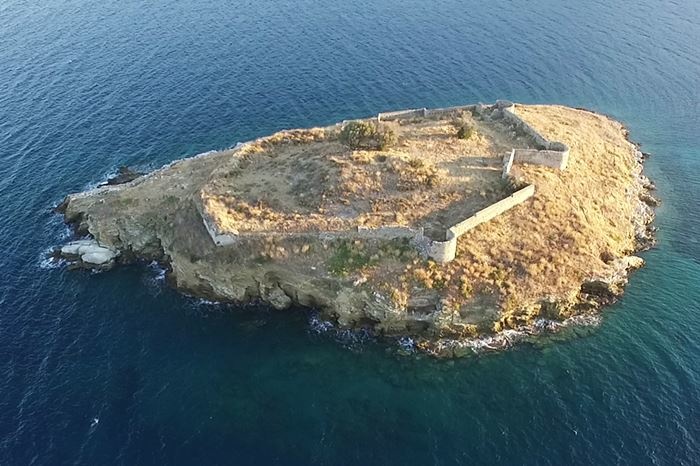
Around two in the afternoon, we finally bid farewell to Burtzi and moved almost strictly eastward, crossing the Saronic Gulf at its widest point. Fresh wind (up to 12-15 m/sec) with NNE allowed us to go almost to the full galfwind on the left tack. After shooting from the anchor, the engines were no longer on and the boat seemed to like it. Under the stack (which this time turned quite quickly) and full grotto, with a tangible roll to the starboard, she really glided fun on the incredibly blue waves, on top of which the white lambs began to appear from time to time. A great windy day with absolutely cloudless sky, smooth wobbling, hissing of waves under the stem and a feeling of incomparable freedom and lightness - these are the first feelings that have not had time to bore us and the long following hours.
It seems we were all just absolutely happy.
Speed confidently kept at the level of 6-7 knots and watch, entrusting control to the autoruder, comfortably positioned in the stern, from time to time looking at the compass. The rest of the crew, disciplined in their life jackets, sat down on the port side with a bird flock, not so much opening the boat as admiring the views around it. Here, on the port side, the island of St. George, which during the Roman Empire was referenced by not very important state criminals, sailed leisurely. But in front of the sea rises the pile of Kithnos, the next intermediate (as we thought) point of our journey. According to the original plan, it was supposed to round the northern tip of the island, passing the strait of the same name, to spend the night in the marina Lautra on its northeast coast, and then move on to Syros.
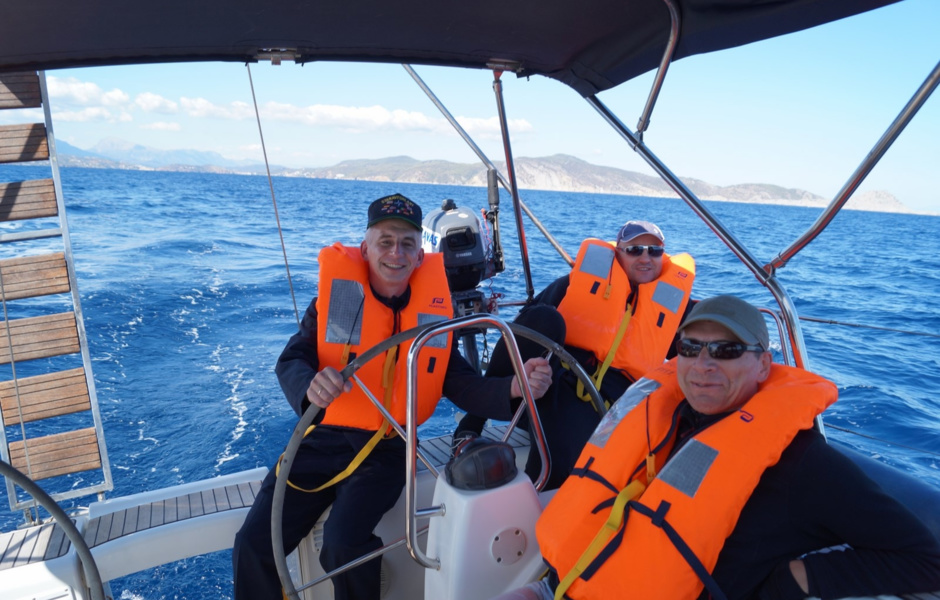
But fate and weather have decided otherwise. As we approached Kithnos, the wind increased (up to 18-20 m/sec) and moved even further north, forcing us to move first on the steep and then on the very steep Baydewind, with fewer sails. With the entrance to the strait also played a role counter surface current (in our case - up to one and a half knots), with almost four-point counter-excitation. Absolute speed was reduced to five and then to barely three knots, with the boat clearly tearing south. An engine was started at full speed to help the sails, but the high rocky shore (without the slightest hint of shelter bay) was still approaching.
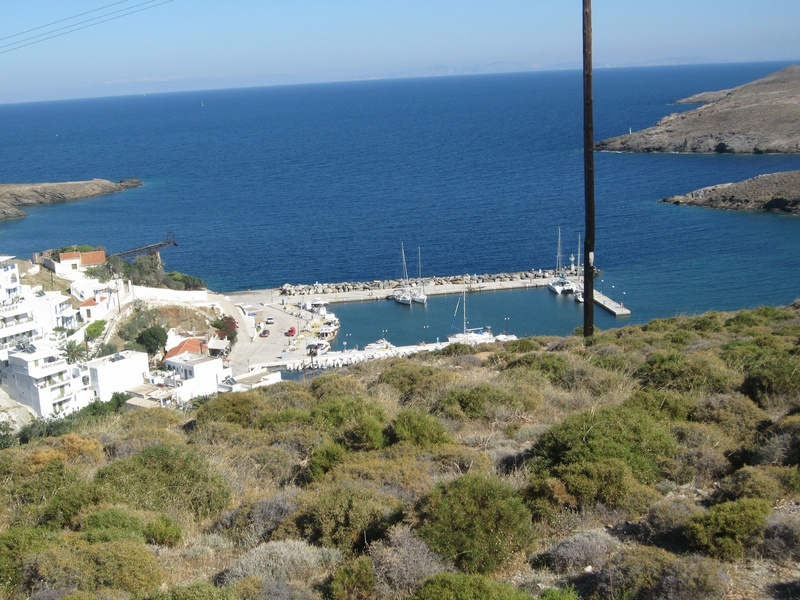
It also started to dusk. It became clear that it would not be possible to circumvent the northern tip of Kitnos. The most risky idea was to remove the sails and, forcing the engine to try to overcome the strait, breaking almost in the forehead against the wind, waves and currents. At the same time we had to spend a stormy night in the sea, in the immediate vicinity of the leeward shore, and the slightest engine failure threatened that our journey would be prematurely completed on the rocks approaching from the starboard side. The second possibility was (before it was too late) to go down in the wind without changing the tack and, trying to hold on to a full tank, to go south along the west coast of Kithnos. We chose a compromise option - to stand in one of the nearest bays of the north-western part of the island, and in the morning to resume attempts to force the strait.
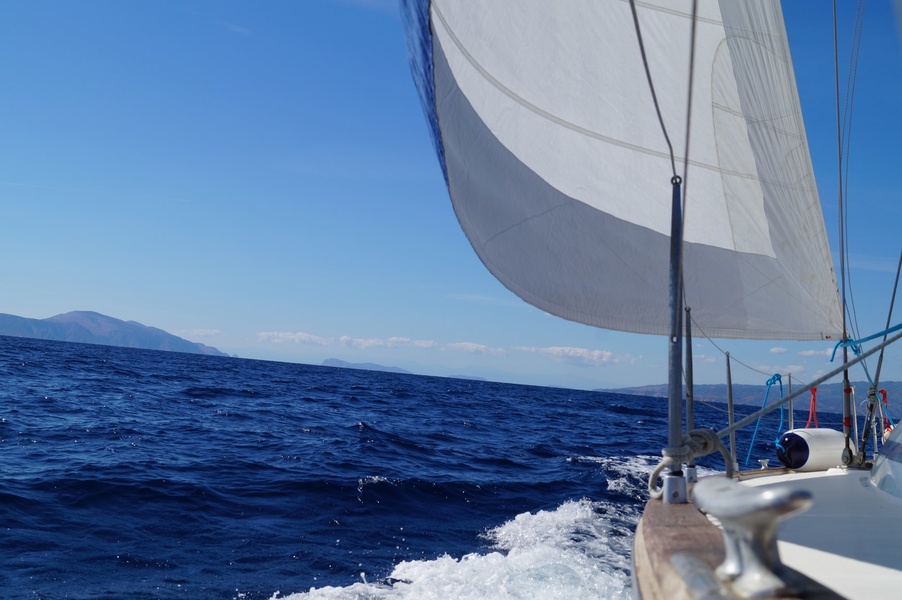
In the beginning, our exercise on approaching an unfamiliar coast in stormy conditions in the dark was successful. In the last rays of the sun we turned to SSE and started to choose a place for future parking. The closest convenient places were Colona, Apokrisis or Episkopis Coves, but we decided that spending the second consecutive night at anchor would be both uncomfortable and uncomfortable. Under the slogan of a civilized marina»«only, we moved further south to the port of Merijas.
It was almost dark when the coveted bay finally opened to us. It was decided to remove the sails and... the trouble immediately began. The grotto had obediently allowed itself to be lowered, but the stack refused to go on holiday again. After almost 20-minute maneuvering at the very entrance to the bay (20-30 meters from the shore), it was decided to go to a larger water area to tame the disobedient sail.
But then something suddenly cracked and our glorious genoa turned its full width, completely out of submission.
As it turned out later, the twist bushing and halyard simply couldn't withstand the emotional strain of the crew: the jib turned into a monstrous-sized flag, the upper end of which was still held on a tripod, while the lower end proudly hung over our heads.
It seemed absolutely unthinkable to go to the pier under such improvised banner, and it could not be lowered (or at least extinguished) in any way. Meanwhile, the boat kept spinning in the immediate vicinity of the rocks. A successful (as it seemed to us then) way out of the situation was to recoil the anchor at a depth of about 30 meters. Alas - we did not know yet that the standard phrase «Give up the anchor», we not only literally say goodbye to our maritime symbol of hope, but also open a new chapter of our adventures.
How to drown 1,200 euros.
After the anchor was repositioned, we were able quite quickly to join forces to humble the jib and finally have dinner, while at the same time making a brief flight analysis. The spin repair was postponed until morning and the crew went to bed to recover from the turbulent events of the past day.
The awakening was early and unexpected. The first one to wake up was a VHF radio station, where someone insistently started to call some «sort of bots» with a number.
As soon as we turned on our English, there was a rumbling sound outside and the cabin was shaded.
Having jumped upwards, we just froze for a moment at the sight of a very majestic spectacle: a car ferry with displacement of thousands of 10-12 tons seeped into the bay to our port. The top of the mast of our boat barely reached the middle of its side, and the wing of the bridge overhanged from above, like a visor. Several energetic Greek expressions (obviously welcoming) were heard from above, to which the most resourceful of our friendly five replied cheerfully: Calimera«!» (Greek. «Good Morning»).
But in fact, the coming day did not promise to be especially kind for us.
In a hurry to defeat the insidious jib, we anchored near the track of the high-speed passenger ferries visiting Merichas with enviable regularity.
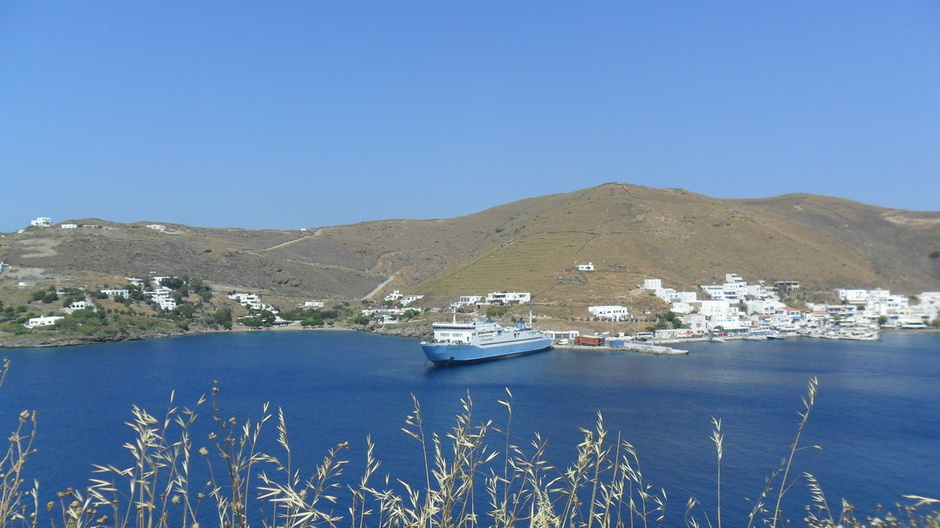
VHF came back to life, and a few minutes later we realized that it was our boat that was being summoned so persistently. We were politely warned that we were posing a danger to navigation, and were asked to get off the fairway as soon as possible. In fact, we wanted to get up to the pier as quickly as possible. The coached team took the anchorage. The commander worked on the engine, the pilot (aka Coke) turned on the windlass, the anchor-chain got out and... - nothing further happened. Despite all the efforts of the electric motor and emotional support of the crew, the anchor flatly refused to leave the cozy rocky crevice at a depth of thirty meters. Attempts to pull it out of the way to success did not lead, and the endurance of the windlass was limited - after a few convulsive jerks above the bow of the boat appeared a light smoke and the air clearly smelled of burning insulation and new troubles.
A few more minutes later we became convinced that we were unusually tightly connected to the bottom of the Aegean Sea, and the windlass completely failed.
Fantastic suggestions like «diving and seeing what was there» or trying to pull the anchor manually were consistently voiced, tried and rejected as unworkable. It was left to wait for help from the shore, which we (bringing together all our stock of technical English) and reported to the shore post.
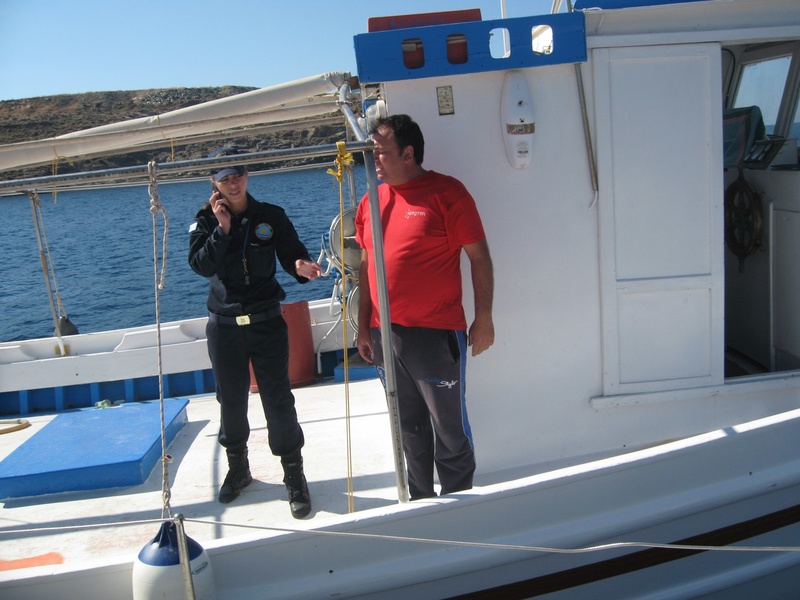
Half an hour later, a small flotilla of fishermen's longboats, led by a police boat, approached our dead anchorage. Quite quickly, the Greek side offered assistance in removing the anchor with the powerful winches of fishing boats. We were hinted that if successful, the rescuers hoped for a modest bonus of 100 euros, to which we happily agreed. However, despite all the efforts of the people so stimulated and modern Japanese technology, the anchor position remained firm.
At the same time, it turned out that:
- We absolutely need to get the boat off the right fairway in the shortest possible time.
- It seems impossible to raise the anchor naturally.
- The only professional diver who can dive to a depth of thirty meters is currently absent in Kitnose.
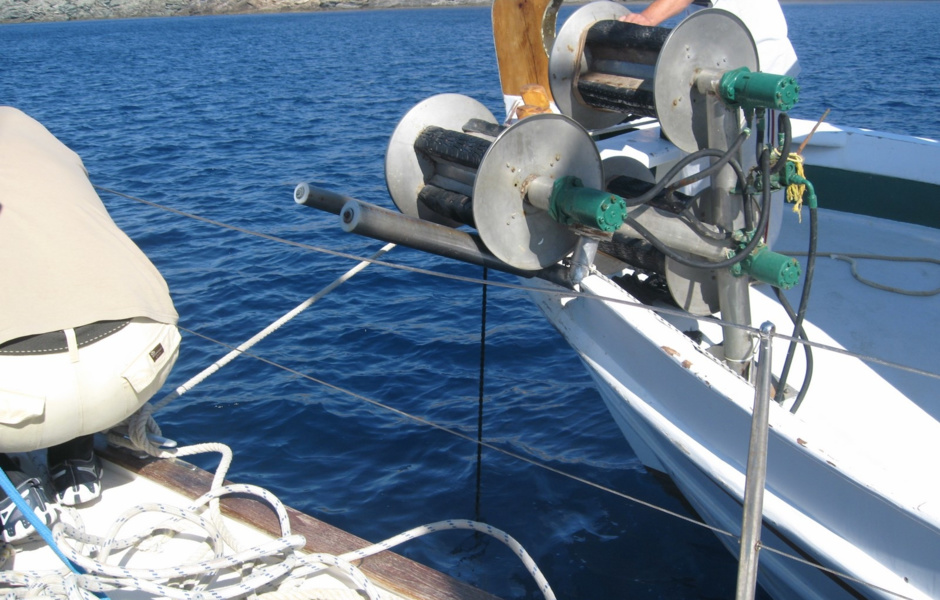
Thus, the boat simply could not stay in place, waiting for the arrival of a representative of the company, as provided by the charter rules. After long negotiations with our shipowner Mr. S., we were offered the only alternative: to move the whole anchor chain to the buoy, followed by the possible removal of the anchor during a special operation. We had to agree to this without knowing that the anchor and chain would never return (at least to their rightful owners) and that we would subsequently have to pay the full price. However, the «old friends of» Mr. S. were given this pleasure at a discount (he said).
We got a new anchor with a 100-metre chain for only €1,200 (installation - bonus) - a sensitive, but not yet the highest fee for gaps in marine practice.
This generous gift, however, could not have been delivered to Kithnos, but was waiting for us at the Lavrio marina, which we had yet to reach by the stormy autumn sea, without a jib or anchor.
New impressions and happy wishes.
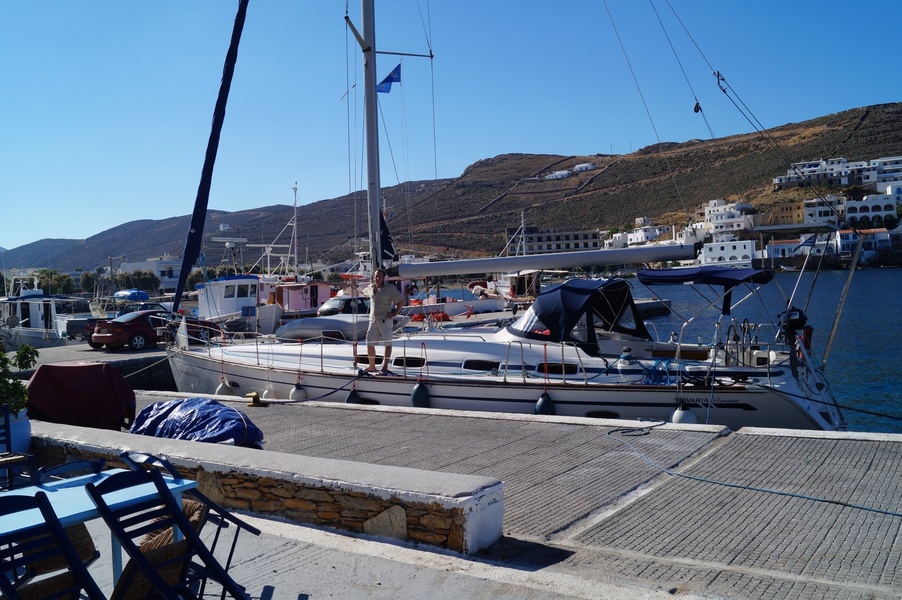
Negotiations and fulfillment of various formalities made us forced guests of Kitnos for almost two days.
In order to avoid fits of despondency, between telephone conversations with the shipowner and regular visits to the police station (all staff were exclusively female), we organized a car tour of the island, renting an old «Renault» for a symbolic 15 euros a day. In half a day we toured and walked around almost the entire northern half of Kithnos, visiting the ancient monastery with Byzantine frescoes, built on the site of a pirate castle on a high rocky promontory crowning its northern tip. At the same time, we saw how comfortable and safe it could be for a boat to anchor on the sandy grounds of the bays of Kolona or Apokrissi.
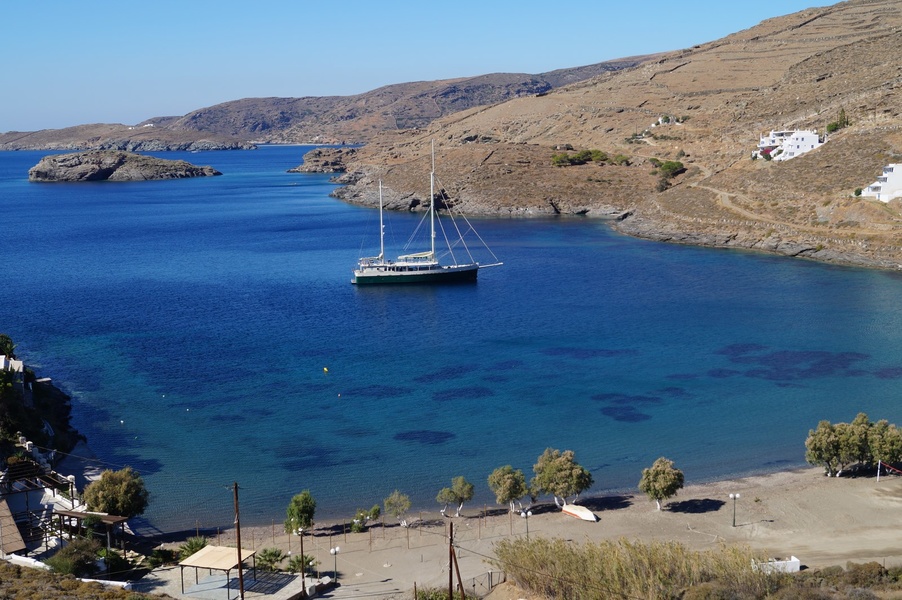
Finally, having settled everything, having resupplied and signed the solemn undertaking that we were going exclusively to Lavrio for repairs, we went back to sea. This time the preparation for the hike was top-notch and the start (to avoid new night surprises) was scheduled for the early morning. Each crew member knew their duties and maneuver, all (not yet broken) mechanisms were checked in advance and worked perfectly, and the mainsail, even left alone, behaved in the most approximate way. With a stable wind with NE 12-15 m/s, most of the almost thirty-mile journey took place in the right tack at an average speed of 5.5-6 knots. However, on the approach to the southern tip of Micronesia Island, the wind increased to 18-20 m/s and moved almost to pure N, which made us put the sail away and continue to walk only on the motor. In the narrow strait between Micronisis and the mainland, the excitement increased, so that we flew into the Lavrio marina amidst foam and splashes, fully feeling the approach of a real storm. And the storm came: in the next two days the sea was literally boiling with lambs, and even in the depths of the bay the wind whistled clearly in its gear. But even such weather could not confuse us - we had to dive into the repair.
For understandable reason, we politely turned down the offer to anchor, securely tied up with a flag, and SMSed Mr. S. about his arrival. Just 20 minutes later, a strong smiley guy appeared on the pier and in excellent English announced that he is a local representative of the charter company, is aware of all our problems and is ready to begin to solve them. He resolutely refused the offered help of unskilled workers, asking only to lower the dinghy.
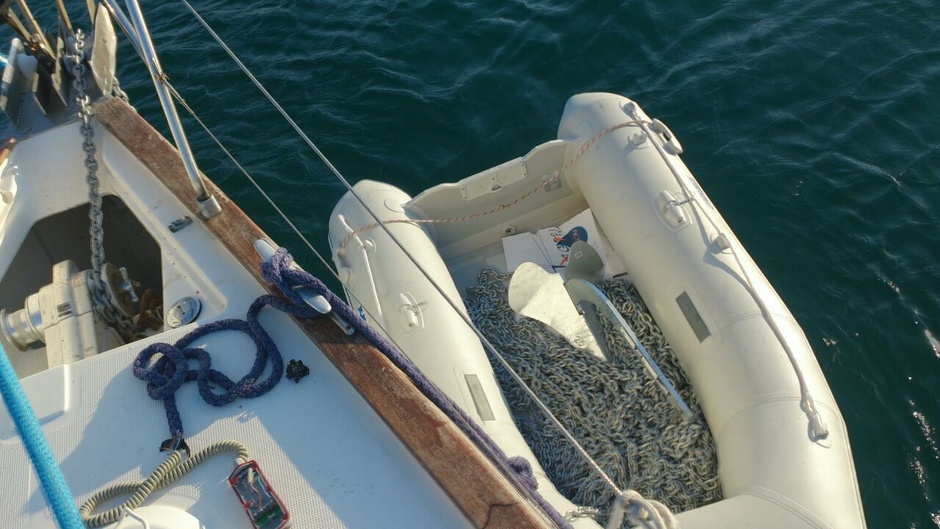
After 40 minutes, the windlass was put into operation and our savior was finishing loading the chain with a new anchor. With the twisting of the jib, the question was more serious - a complete replacement of the drum was required. Mr. S. promised to personally bring the new one from Athens, and at the same time with the master's eye to assess the real state of the boat. The honor of meeting him the next day was entrusted to me (thanks to my more or less tolerable English), while the rest of the crew took the opportunity and made an interesting tour of Cape Sunion with a visit to the ancient temple of Poseidon.
By the way, I seriously recommended them to combine the pleasant with the useful and at the same time put in a good word for the fate of the remnants of our vacation to the lord of the seas.
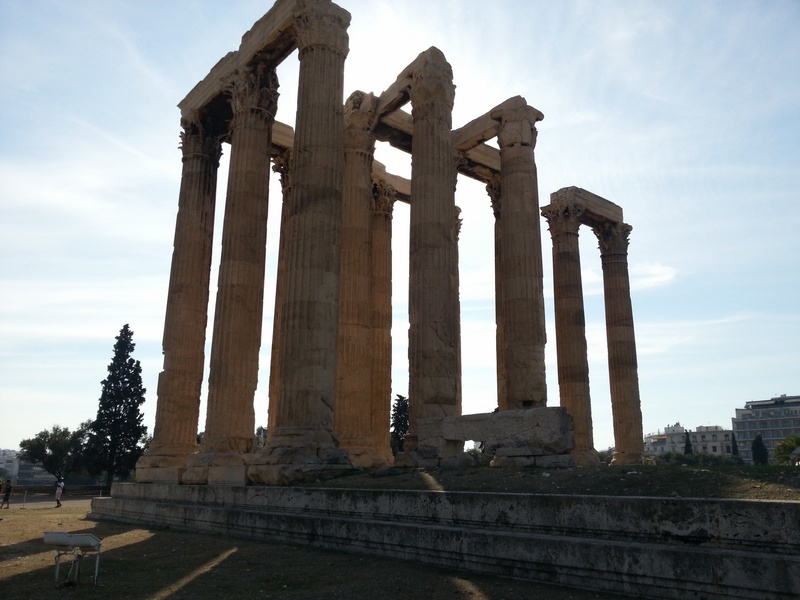
It took me two hours to repair the twist, during which I not only substantially replenished my technical English, but also listened to different stories from the lives of yachtsmen. Most of the stories were related to the various boat accidents and the miraculous rescue of the brave yachtsmen who do their best to break something, sink and drown themselves. As a farewell, Mr. S. inquired about our future plans, shared a near-term weather forecast for the North Cyclades (N-NE wind from 40 knots was expected) and tactfully recommended to spend the rest of the week in a pleasant and quiet sailing in the Saronic Gulf islands.
«You see, the boat is insured, but you are not»," he optimistically noted goodbye and wished us a good rest.
The island of Kea: back and forth.
The same evening, the happy crew of the fully functional boat gathered again for the military council. To go to Delos, we no longer had time, but to return to the calm waters of Saronic considered an unforgivable weakness. It was decided to make a «small circle», bypassing Kea, Giros, Siros and Kithnos, and then return to their native Kalamaki with triumph. The north wind was a few verses, but remained fairly fresh (15-18 m/s), so that the next morning the boat was blown through the narrow Strait of Micronisis with fluff. Like the sailors of antiquity, we walked through the sight of Sunion and then went into the left tack on the left tack, aiming at the northern tip of the island of Kea.
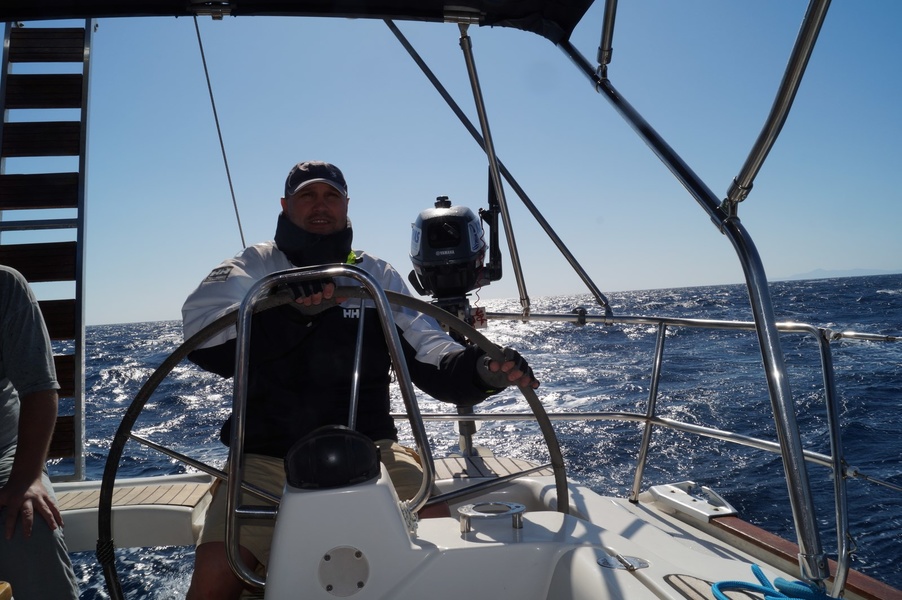
Setting and cleaning sails, turning, approaching the island and maneuvering at the entrance of Aos Nikolaos Bay, finally mooring at the pier in Vourkarion harbour - everything was done clearly, amicably and smoothly - as in the textbook. Fascinated by the success, we made grateful sacrifices to Poseidon and Dionysus, after which we went to look at the surroundings.
The plans for tomorrow were to tour the whole island, but... - ...the insidious Greek gods were preparing us for a new test.
Before dawn, there were two incidents at once. First, one of the yachts, moored to the Muringian buoys, somehow fell off its tether and set off for free sailing.
The wind and the waves led her to the pier, trying to pile on boats standing here, including ours. The situation was saved by the fans of night smoking: the cranes appeared instantly, the engine was started and a rescue party of two people landed on board the «Flying Dutchman». Naval was avoided, the drifting boat was caught and tamed, but... the subsequent attempt to remoor it suddenly turned out that our «Bavaria» suddenly stopped obeying the helm!

In the tiller room, a sad spectacle awaited us: The hydraulic cylinder cover had been ripped off and the steering gearbox housing had simply fallen to pieces.
We were not destined to find out whether the cause of the breakage was the original defect of the unit, the wrong mounting or basic maintenance - the main thing is that it was not our fault and could not be. But the problem wasn't less: the hydraulic control of the boat was completely out of order. It seemed impossible to continue the planned trip on the tiller, so we had to send an SMS-SOS to Mr. S. (attaching a picture of the emergency gearbox) and wait for help.
This time a Philipinian mechanic from the Athens office has arrived to rescue us. By the evening he was already on board, carefully examined the damage and, having consulted with his boss, made a verdict: repair can be carried out only at the base in the marina Alimos, where we should go immediately - on manual control.
If in response to this our guest expected to hear the moans of gentle tourists and a call for help, he made a cruel mistake.
After a short meeting, the crew quickly removed the steering wheels, replacing them with a tiller, and after 15 minutes the boat was already anchored.
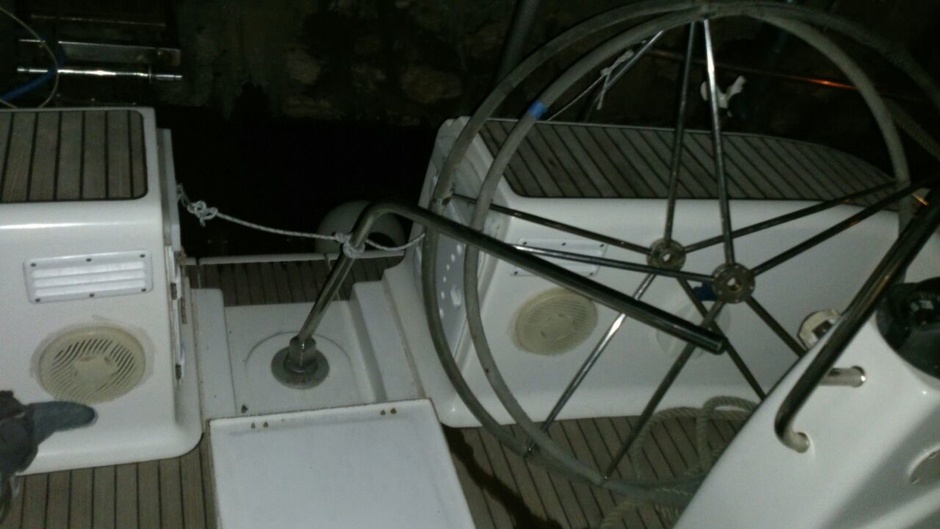
Fortunately, the weather was favourable for our company. Wind speed (NNW-NW) did not exceed 10-12 m/s, and as we deepened into the Saronic Gulf it dropped to 5-7 m/s. We did not set sails, and in the darkness the boat went under the engine, confidently doing 5-6 knots. To control the tiller the crew was broken down into paired shifts, which changed every 20-30 minutes, resting immediately on the sofa in the open cockpit.
Our guest stayed overnight in the salon. At first he looked at the navigator's screen and looked out - to the helmsmen - obviously not quite trusting our experience and skill, but then he calmed down and fell asleep firmly. The night crossing took almost eight hours and could have seemed even pleasant. The sea was calm, the sky clear, the moon and stars shining brightly. To the left of the horizon there were and again disappeared ghostly silhouettes of islands, and to the right the banks of Attica became dark. However, to admire all this beauty remained only short minutes of rest, when the hands could be detached from the tiller, and eyes - from the compass cartouche.
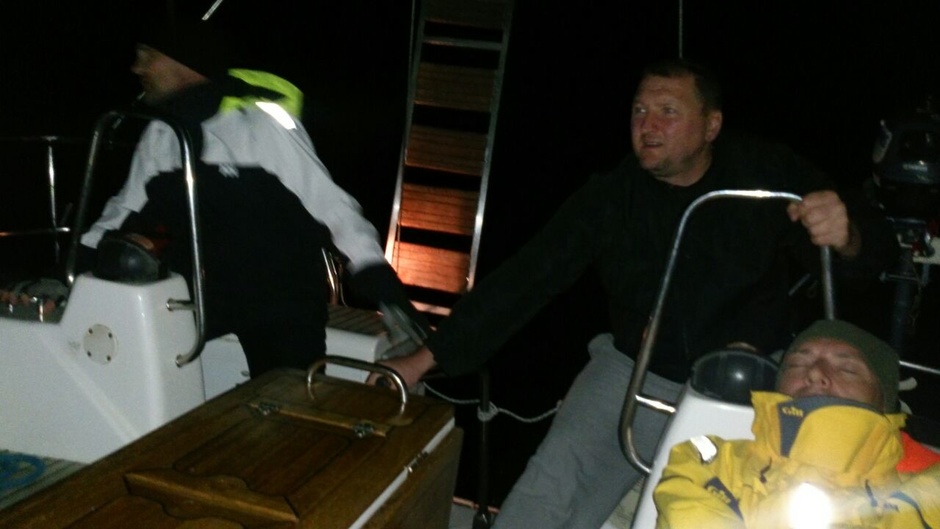
At the beginning of the third hour of the morning we finally entered the marina Alimos and carefully snuck to our place by the pier. Now we should have rested for a while and prepared for Mr. S's visit. He appeared at the gangway around seven, all in the same democratic outfit and with a loaf of bread in a paper bag under his armpit. With a radiant smile, he gave us bread, and then expressed a fervent desire to examine the tiller room. Apparently what he saw there made a lasting impression on the excellent yachting man, as he refrained from commenting and left, inviting us to stop by his office closer to 9am.
The new meeting took place in an exceptionally correct business atmosphere and was accompanied by frequent use of not only technical but also legal terms. As a result, we still had to pay for the anchor and 100 meters of anchor chain, as we could not prove that it was given away under force majeure circumstances provoked by the breakage of the jib twist. On the other hand, the helmsman's accident was one of the «inevitable accidents at sea», and as compensation for the remaining three days we were given an even larger Oceanis 50 boat.
Instead of an epilogue.
The following days on a new boat (compared to «Bavaria» it seemed even luxurious) did not enrich us with extreme experience, but brought a lot of bright pleasant impressions. We celebrated the Day of Ohi on the island of Aegina, visited the cities of ancient people on the island of Kira and bathed in sulfur springs of quiet Methane. Despite the inevitable mistakes for beginners, the holiday was a success, giving amateurs an invaluable experience. And then there were new boats and new travels - but no accidents...
